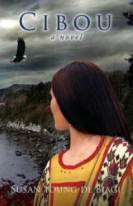 Cibou, by Susan Young de Biagi – Cape Breton University Press, 2008
Cibou, by Susan Young de Biagi – Cape Breton University Press, 2008
A 17th century Mi’Kmaq maiden’s life changes as she spends time with two brothers from France: Jesuit missionary Antoine Daniel and his sea-faring brother Charles. French fishermen have traded with this group of natives on the Atlantic shores of what will one day be Canada for perhaps 100 years, and by the time of the novel the French/English power struggle for this part of North America is beginning to affect the indigenous population.
Cibou shows the Mi’Kmaq community’s daily life and observations of the French and English foreigners through the eyes of a young woman named Mouse. Author Susan Young de Biagi depicts the Mi’Kmaq as a people of integrity and spirituality, living in harmony with nature and caring for the less-fortunate among them.
Susan Young de Biagi has given us a well-written story with characters and events that linger after the final page has been turned. I think the best part of this gift is the Mi’Kmaq approach of looking at life – really observing and chewing it over – and finding life lessons to apply. Whatever our culture of origin, as we’ve moved away from the oral tradition we’ve lost the propensity to do this.
This isn’t a novel to rush, nor is it dry and heavy. It flows gently, thoughtfully, and is well worth a second read. One of my favourite characters is the chief, a man who embodies Fr. Antoine’s God’s call to lead through servanthood. The chief is wise and deserves the people’s confidence, but he doesn’t look the part except on formal occasions. His wife complains (with pride) that every time she makes him a thick new robe, he gives it to someone in need.
The author presents Mi’Kmaq spirituality and Antoine’s Christianity with sensitivity, as an integral part of the characters’ lives. She makes no comment, but leaves readers to take – or not – what they will from this as from the rest of the book. As a Christian, I found much to think about.
In a culture where mainstream fiction often portrays Christians’ failings and bad examples, it’s refreshing to see a character who “gets it right.” For those who prefer to see where Christians go awry, there’s a hot-tempered zealot to offset Antoine’s practical love.
A review by Maura Hanrahan in the Catholic Register suggests the novel would have been better served with Antoine as the viewpoint character. I can’t agree.
We see both Antoine’s and Charles’ values more clearly through Mouse’s fresh eyes, and would have missed much of Mi’Kmaq culture if we only saw what a stranger saw. Plus, we’d miss the sometimes-laughable interpretations these gentle people put on what we understand as common practices. (Mouse and her friend, Bright Eyes, for example, are horrified by Antoine’s use of a handkerchief.)
Plus, Antoine would have been too good to be true if we knew him from inside his own head. As might the chief. Characters who are very noble or wise are best presented in small doses lest the reader feel inadequate or preached at. Mouse, with her clear-sighted timidity, makes an ideal observer. She sees, and leaves us to draw our own conclusions.
The same review commented on the stiffness of the Mi’Kmaq dialogue. I have no idea how real 17th century Mi’kmaq spoke among themselves, but to me the dialogue felt natural and flowed well, regardless of its historic authenticity. Instead of stiffness, I heard an older pattern of speech, which helped transport my imagination into the past.
Cibou is Susan Young de Biagi’s first novel. A former Nova Scotian, she resides in British Columbia. Ken Chisholm of the Cape Breton Post reports, “De Biagi is working on her next novel, due in a couple of years, about Alexander Graham Bell and the Silver Dart.” I’ll be looking forward to it.
You can read the first few pages of Cibou here. The novel is in stores now, and available online.
Like this:
Like Loading...

